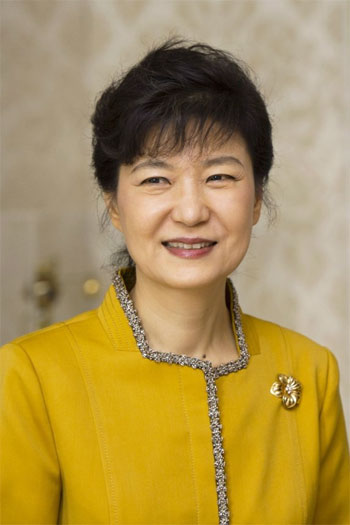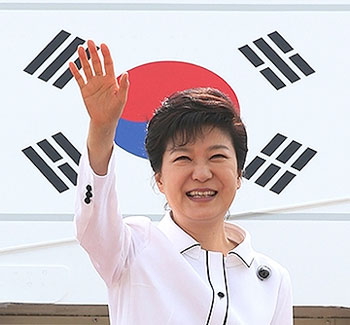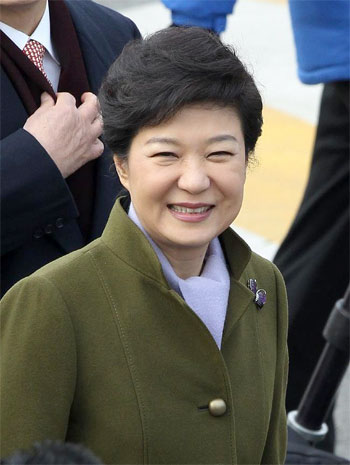|
|
|
 , ,
Font size |
Park Geun-hye: One of the Most Powerful Women in the World
 Forbes
included her in the list of 2013 most powerful persons of the world. Park
Geun-hye is the eleventh and current President of South Korea. She is the first
woman to be elected as President in South Korea, and is serving the 18th
presidential term. She also is the first woman head of state in modern history
of Northeast Asia. Prior to her presidency, she was the chairwoman of the
conservative Grand National Party (GNP) between 2004 and 2006 and between 2011
and 2012 (the GNP changed its name to "Saenuri Party" in February 2012). Forbes
included her in the list of 2013 most powerful persons of the world. Park
Geun-hye is the eleventh and current President of South Korea. She is the first
woman to be elected as President in South Korea, and is serving the 18th
presidential term. She also is the first woman head of state in modern history
of Northeast Asia. Prior to her presidency, she was the chairwoman of the
conservative Grand National Party (GNP) between 2004 and 2006 and between 2011
and 2012 (the GNP changed its name to "Saenuri Party" in February 2012).
Park was also a member of the Korean National Assembly, and had served four
consecutive parliamentary terms as a constituency representative between 1998
and 2012; starting her fifth term as a proportional representative from June
2012. Her father was Park Chung-hee, President of South Korea from 1963 to 1979.
She is generally considered to be one of the most influential politicians in
Korea since the presidencies of the two Kims: Kim Young-sam and Kim Dae-jung.
Park was born on 2nd February 1952, in Samdeok-dong of Jung-gu, Daegu, as the
first child of Park Chung-hee, the 3rd president of South Korea who served
between 1963 and 1979, and Yuk Young-soo. She has a younger brother, Park Ji-man,
and a younger sister, Park Seoyeong. Park has never been married. In 1953, her
family moved to Seoul and she graduated from Seoul's Jangchung Elementary School
and Sungshim (literal: Sacred Heart) Girls' Middle & High School in 1970, going
on to receive a bachelor's degree in electronic engineering from Sogang
University in 1974.
She also briefly studied at the University of Grenoble, but left France
following the death of her mother. Park received honorary doctoral degrees from
the Chinese Culture University, in Taiwan in 1987; Pukyong National University
and KAIST in 2008; and Sogang University in 2010. Park's mother was assassinated
in the National Theater of Korea, Seoul, by Mun Se-gwang, a Japanese-born North
Korean assassin, and a member of the General Association of Korean Residents in
Japan, under the direction of the North Korean government on 15 August 1974.
Park was regarded as first lady until 1979 when her father was also
assassinated�by his own intelligence chief, Kim Jae-gyu, on 26 October 1979.
During this time, activists who were political opponents of her father, claimed
to be subject to arbitrary detention. Further, human rights were considered
subordinate to economic development. In 2007 Park expressed regret at the
treatment of activists during this period.
Park was elected a Grand National Party (GNP) assemblywoman for Dalseong, Daegu,
in 1998 by-election, and three more times in the same electoral district between
1998 and 2008, being the incumbent assemblywoman till April 2012. In 2012, Park
announced that she would not run for a constituency representative seat for the
19th election in Dalseong or anywhere else, but for a proportional
representative position for the Saenuri Party instead, in order to lead the
party's election campaign. She was elected as a proportional representative in
the April 2012 election.
Due to the failed attempt to impeach President Roh Moo-hyun, and the bribery
scandal of its 2002 presidential candidate, Lee Hoi-chang (revealed in 2004),
the GNP was facing a severe defeat in the 2004 general election. Park was
appointed as the chairwoman of the party and led the election efforts. In the
election, the GNP lost its majority position, but managed to gain 121 seats,
which is largely considered a great achievement under such inhospitable
circumstances for the party. As the chairwoman of the GNP, Park helped her party
make significant gains in local elections and actually obtain a majority in
2006.
 During the campaign on 20 May 2006, Ji Chung-ho, a 50-year-old criminal with
eight previous convictions, slashed Park's face with a utility knife, causing an
11-centimeter wound on her face, requiring 60 stitches and several hours of
surgery. A famous anecdote from this incident occurred when Park was
hospitalized after the attack. The first word that she said to her secretary
after her recovery from her wound was "How is Daejeon?" After this, the
candidate from the Grand National Party won the election for mayor of the city
of Daejeon despite having trailed by more than 20 percentage points in opinion
polls up to the point of the attack. In addition, during Park's term as the GNP
chairwoman between 2004 and 2006, the party won all 40 reelections and
by-elections held, which was largely credited to Park's influence and efforts.
This feat gave Park a nickname "Queen of Elections". During the campaign on 20 May 2006, Ji Chung-ho, a 50-year-old criminal with
eight previous convictions, slashed Park's face with a utility knife, causing an
11-centimeter wound on her face, requiring 60 stitches and several hours of
surgery. A famous anecdote from this incident occurred when Park was
hospitalized after the attack. The first word that she said to her secretary
after her recovery from her wound was "How is Daejeon?" After this, the
candidate from the Grand National Party won the election for mayor of the city
of Daejeon despite having trailed by more than 20 percentage points in opinion
polls up to the point of the attack. In addition, during Park's term as the GNP
chairwoman between 2004 and 2006, the party won all 40 reelections and
by-elections held, which was largely credited to Park's influence and efforts.
This feat gave Park a nickname "Queen of Elections".
On 12 February 2007, Park made a much-publicized visit to Harvard University, in
Cambridge, Massachusetts, United States. Her visit culminated in an address to a
packed audience at the Kennedy School of Government, where she said she wanted
to "save" Korea and advocated a stronger relationship between South Korea and
the United States.
Park hoped to emulate her father's success by becoming the presidential nominee
of the Grand National Party. She eventually lost to Lee Myung-bak by a narrow
margin. Lee had a commanding lead at the beginning of the primary season, but
Park was able to narrow the gap through allegations of Lee's corruption. Park
won the "party member's bid", but she lost the "national bid" which is a larger
percentage of the total presidential bid.
After the 2007 presidential election, President Lee Myung-bak formed a
government of mostly close supporters. Park's supporters argued that this was a
kind of political reprisal, and that they should secede from the Grand National
Party. Eventually, they formed parties named Pro-Park Coalition and Solidarity
for Pro-Park Independents, Chin Park Musosok Yeondae). Park herself did not join
them, but indirectly supported them by announcing "I hope these people to come
back alive". After the mass secession, the rebels announced that they would
rejoin GNP after the general election, but the GNP prohibited it. In the
following 2008 general election, the rebels won 26 seats: 14 from the Pro-Park
Coalition and 12 as independents. Together, they played a pivotal role in the
GNP's narrow majority. Park continually insisted that GNP should allow the
return of her supporters. As of 2011, most of these rebels had returned to the
GNP, resulting in approximately 50 to 60 assembly members who support Park out
of 171 in the GNP.
As a response to the dwindling approval rating of the GNP, the party formed an
emergency committee and changed the name of the political party from the Grand
National Party to the Saenuri Party, meaning "New Frontier" Party. On 19
December 2011, Park was appointed as the chairwoman of GNP's Emergency
Committee, the de facto leader of the party.
The Saenuri Party achieved a surprise win against the opposing Democratic United
Party in the 2012 General Election, winning 152 seats and retaining its majority
position. Because of the corruption scandals of the Lee administration revealed
before the election, the Saenuri Party was widely expected to win no more than
100 seats. During the 13-day campaign period, Park traveled about 7200 km around
South Korea, visiting more than 100 constituencies. It is the consensus of
Korean news media and political experts that the most important factor which led
to Saenuri Party's victory was Park's leadership. For this reason, the 2012
election was often dubbed the "return of the Queen of Election". Saenuri's
defeat in the populous Seoul metropolitan area in this election, however,
revealed the limitation of Park's political influence.
 Park had been the leading candidate for the 2012 presidential election in every
national-level poll in South Korea between 2008, when the Lee Myung-bak
administration began, and September 2011, with an approval rating of 25% to 45%,
more than twice that of the second candidate. Park's approval rating was highest
when the 2008 National Assembly election showed her strong influence and lowest
in early 2010 as a result of her political stance against the Lee administration
in Sejong City issue. In September 2011, Ahn Cheol-soo, a former venture IT
businessman and the Dean of Graduate School of Convergence Science and
Technology at Seoul National University, emerged as a strong independent
candidate for the presidency. In national-level presidential polls in September
2011, Ahn and Park Geun Hye closely competed for the status of front-runner,
with Park losing the top seat in some polls for the first time since 2008. Park had been the leading candidate for the 2012 presidential election in every
national-level poll in South Korea between 2008, when the Lee Myung-bak
administration began, and September 2011, with an approval rating of 25% to 45%,
more than twice that of the second candidate. Park's approval rating was highest
when the 2008 National Assembly election showed her strong influence and lowest
in early 2010 as a result of her political stance against the Lee administration
in Sejong City issue. In September 2011, Ahn Cheol-soo, a former venture IT
businessman and the Dean of Graduate School of Convergence Science and
Technology at Seoul National University, emerged as a strong independent
candidate for the presidency. In national-level presidential polls in September
2011, Ahn and Park Geun Hye closely competed for the status of front-runner,
with Park losing the top seat in some polls for the first time since 2008.
After her victory in the 2012 General Election, Park's approval rating increased
significantly. In a national-level survey by Mono Research on 30 August Park was
the top presidential candidate with an approval rating of 45.5% when competing
with all potential candidates, and according to another recent national survey
result, had a higher approval rating (50.6%) than Ahn (43.9%) in a two-way
competition with him as of 11 September.
On 10 July, Park formally announced her 2012 presidential bid at the Time
Square, Yeongdeungpo-gu, Seoul. In this event she emphasized the right to pursue
happiness, a democratic economy, and customized welfare services for the Korean
people. The opposing Democratic Party elected Moon Jae-in as its presidential
candidate on 17 September. And Ahn announced his presidential bid on 19
September. Although still a leading candidate, in two-way competitions Park had
lower approval ratings against Ahn's and against Moon's according to a 22
September national survey. She was elected as the President of the Republic of
Korea on 19 December 2012 with the approval of 51.6% of Korean voters.
In a 2012 survey by Korean Research which assessed the political stance of 12
potential presidential candidates of South Korea, Park was considered the most
conservative candidate.
Her conservative, market-oriented political stance was well reflected in her
campaign pledge for 2008 presidential bid to cut taxes, reduce regulation, and
establish strong law and order. Since 2009, however, Park started to focus more
on welfare issues, advocating customized welfare services to the South Korean
people. Park is well known for her strict, no-compromise adherence to political
promises. In 2010, for example, she successfully stopped the Lee
administration's attempt to cancel the plan to establish Sejong City, a new
national center of administration, arguing the plan was a promise made to
people. This conflict between Park and Lee Administration cost her a
considerable decrease in her approval rating at the time.
In 2012, Park also vowed to construct a new airport in the southeastern region,
a 2008 presidential campaign promise made by GNP but cancelled in 2011, despite
claims of economic infeasibility of the plan. The administrative vision of
President Park Geun-hye�s new government is "A new era of hope and happiness."
The five Administrative Goals of the government are "a jobs-centered creative
economy," "tailored employment and welfare," "creativity-oriented education and
cultural enrichment," "a safe and united society" and "strong security measures
for sustainable peace on the Korean Peninsula." The Park Geun-hye administration
plans to create a trustworthy, clean, and capable government through carrying
out these goals, related strategies, and tasks.
Park became the 18th president of South Korea on February 25, 2013. At midnight,
she took over all presidential authorities including the prerogative of supreme
command of South Korea's armed forces from her predecessor Lee Myung-bak. In her
inauguration speech at the National Assembly building, Park spoke of her plan to
open a new era of hope through "economic prosperity, people's happiness, and
cultural enrichment."
She particularly expressed her hope that North Korea would give up its nuclear
arms and walk on the path of peace and mutual development, and declared that the
foundation for a happy era of unification in which all Korean people will be
able to enjoy prosperity and freedom and realize their dreams would be built
through the Korean Peninsula Trust-building Process. In her inauguration speech,
Park presented four guiding principles to realize her administrative vision:
economic prosperity, people's happiness, cultural enrichment, and establishment
of foundation for peaceful unification. Park's inauguration ceremony was the
largest one in Korean history with 70,000 participants, which shows the Korean
people's high interest and adminiration towards the new president. Diplomatic
representatives in Korea as well as high-level delegates specially sent from 24
countries around the world including Thai Prime Minister Yingluck Shinawatra,
U.S. National Security Advisor Thomas Donilon, and former Japanese Prime
Minister Yasuo Fukuda also participated in the event to congratulate Park.
 After taking office, Park met John Kerry and Barack Obama. Park`s trip to the
United States was her first foreign trip after taking office. Like many of her
predecessors, Park has maintained a close relationship with the South`s main
ally the U.S., which has over 20,000 soldiers stationed there. (See USFK).
During her visit to the U.S., she addressed a joint session of Congress, where
she called for a united front against North Korean provocations. Park also
called for a global relationship between South Korea and the United States. After taking office, Park met John Kerry and Barack Obama. Park`s trip to the
United States was her first foreign trip after taking office. Like many of her
predecessors, Park has maintained a close relationship with the South`s main
ally the U.S., which has over 20,000 soldiers stationed there. (See USFK).
During her visit to the U.S., she addressed a joint session of Congress, where
she called for a united front against North Korean provocations. Park also
called for a global relationship between South Korea and the United States.
President Park assesses the security situation on the Korean Peninsula and
emphasized that deterrence capabilities were the most important factor for
security. Thus, President Park considers the Korea-U.S. alliance as the most
successful one in the world. And she hopes the Korea-US relationship can be
upgraded from a comprehensive strategic alliance to a global partnership.
Park had been often criticized for being the "daughter of a dictator Park Chung-hee"
and for not actively supporting the Lee administration by supporters of Lee
Myung-bak. A national-level poll conducted in July 2012 by a conservative
newspaper reported that 59.2% of participants responded they did not believe
Park was a "daughter of a dictator" while 35.5% agreed with the
characterization.
During a recent interview with the Cheongju broadcast station CJB, Park
commented regarding her stance that her father's May 16 coup was a �revolution
to save the country� by stating, �I don�t think it�s the place of politicians to
be fighting over whether the events of 1961 were a �coup d�etat� or a
�revolution��. In a July 2012 survey, 49.9% of respondents answered that they
disagreed with Park's assessment that her father�s 1961 coup was �unavoidable,
the best possible choice, and an advisable decision,� as opposed to 37.2% that
agreed.
Video
Dated 18 November 2013
|
|
|
|
|
|
|









